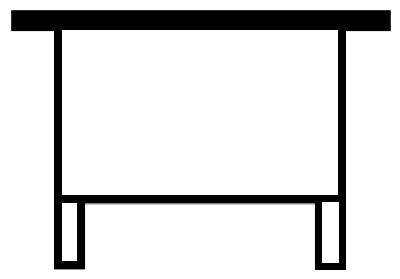4 Common Outdoor Rabbit Hutch Design
There are actually 4 common designs when building a rabbit hutch roof top in which we are going to tackle each of them on this discussion. But first, why is it important to choose the appropriate design for your rabbit hutch?
The design of a rabbit hutch's roof top is very important because it offers safety, protection and comfort for your pet.
Safety
You have to know that the roof top is what provides covering for your pet from different changes of weather condition. It ensures the safety of your rabbit inside its hutch during summer, winter or rainy season.
Protection
A certain animal predator who want to eat your rabbit will most likely going to try every possibly options to get inside your pet's hutch and this includes the roof top. Poorly designed roof tops could end up easily broken by a large creature with powerful paw such as the fox.
Comfort
With the right roof top design, your pet will experience great comfort. A good example will be on rainy season. A well designed roof top doesn't have any leaks ensuring that your pet won't get wet or have a bad experience of being sprinkled with water from the rain.
Here are the 4 common rabbit hutch roof top designs:
1. Flat Roof Top Design
As shown on the image below, the roof top is horizontally flat. This design is best recommended if you intend on placing your rabbit hutch under another shelter such as your old unused garage.

2. Slanted Roof Top Design
The roof is designed in which it is positioned slightly diagonal with an angle (inside) of around 30 degrees. Check the image below for illustration.

3. A Type Roof Top
It's called A-Type because the roof top design is similar to the shape of the letter "A". This design is best suitable on places that experiences rain and winter seasons.

4. Slanted Roof Top On Both Sides
This roof top design is very similar to the A Type but the only difference is that, the surface (inside) angles on each side falls between 20 to 30 degrees.

For this kind of design, it is best suited on places that do often experience rain falls.
The design of a rabbit hutch's roof top is very important because it offers safety, protection and comfort for your pet.
Safety
You have to know that the roof top is what provides covering for your pet from different changes of weather condition. It ensures the safety of your rabbit inside its hutch during summer, winter or rainy season.
Protection
A certain animal predator who want to eat your rabbit will most likely going to try every possibly options to get inside your pet's hutch and this includes the roof top. Poorly designed roof tops could end up easily broken by a large creature with powerful paw such as the fox.
Comfort
With the right roof top design, your pet will experience great comfort. A good example will be on rainy season. A well designed roof top doesn't have any leaks ensuring that your pet won't get wet or have a bad experience of being sprinkled with water from the rain.
Here are the 4 common rabbit hutch roof top designs:
1. Flat Roof Top Design
As shown on the image below, the roof top is horizontally flat. This design is best recommended if you intend on placing your rabbit hutch under another shelter such as your old unused garage.

2. Slanted Roof Top Design
The roof is designed in which it is positioned slightly diagonal with an angle (inside) of around 30 degrees. Check the image below for illustration.

3. A Type Roof Top
It's called A-Type because the roof top design is similar to the shape of the letter "A". This design is best suitable on places that experiences rain and winter seasons.

4. Slanted Roof Top On Both Sides
This roof top design is very similar to the A Type but the only difference is that, the surface (inside) angles on each side falls between 20 to 30 degrees.

For this kind of design, it is best suited on places that do often experience rain falls.





0 comments:
Post a Comment